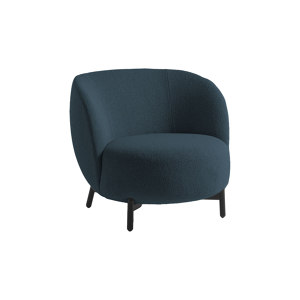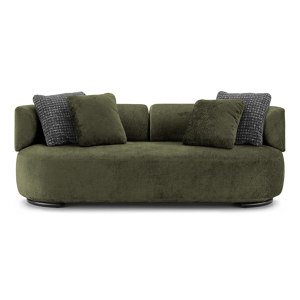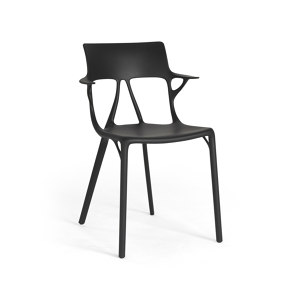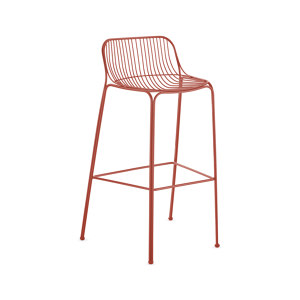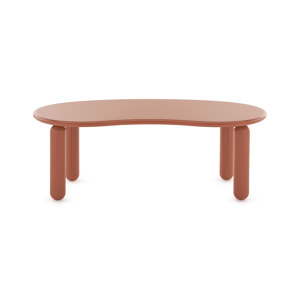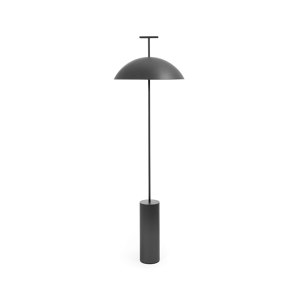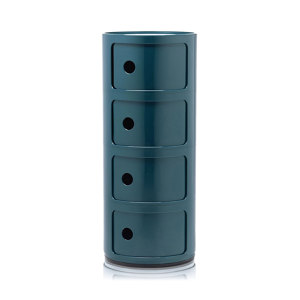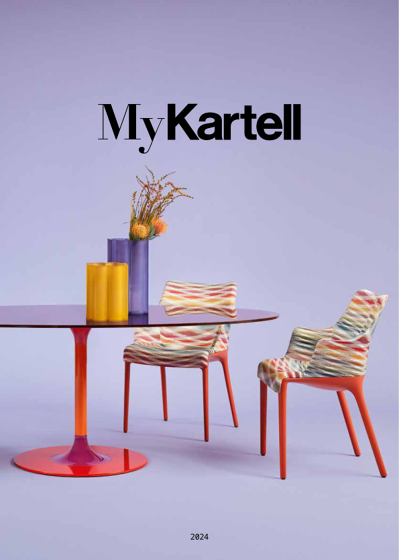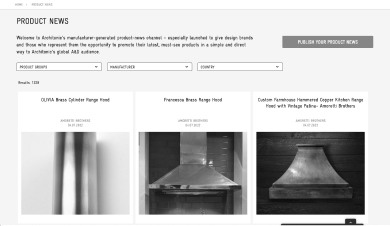About Kartell
MORE ABOUT KARTELL
Kartell is proud to be a solid, sustainable, innovative and international family firm.
Kartell has always been a creative workshop in which designers use a range of materials to create industrial products for indoor and outdoor applications. Today, in pursuit of a strategy that takes in the needs of many different markets, our product range has been expanded to cover everything from lounge furnishings to lighting. Kartell’s sofas and armchairs, tables and chairs, lamps and accessories combine to create stylish environments and furnishing solutions for public spaces and private homes.
The designers who work with Kartell focus their creativity on transforming concepts into industrial products. Their creations have turned our brand culture into a lifestyle.
Kartell is inspired by certain keywords that are deeply rooted in the history of our brand and that have guided its evolution over the years.
Quality, innovation, ingenuity, research, materials, design and beauty are strategic linchpins in our approach to business – an approach that values the past but looks to the future.
Since our company’s earliest beginnings, we have always paid the greatest attention to research, innovation and developments in technology. Starting with functional objects for domestic use, Kartell has revolutionised the history of post-war design, creating highly sophisticated products that combine advanced manufacturing techniques with innovative materials like carbon fibre and biopolymers. The evolution of Kartell has been supported by the dedication and passion of three generations who have all actively developed the brand and helped it to evolve.
Kartell was founded by Giulio Castelli in 1949. In the following years, the company took its first steps to develop the design philosophy that would go on to become the starting point for the ‘Made in Italy’ brand. In those early years, some of the great names of design and architecture worked for the young company, including Anna Castelli Ferrieri, wife of Giulio Castelli and the first female architect in Milan, Gino Colombini, Achille and Pier Giacomo Castiglioni, Joe Colombo, Marco Zanuso, Gae Aulenti, Richard Sapper, Giotto Stoppino and Ignazio Gardella. In the 1970s, Kartell also drove innovation in communications, another historic aspect of the brand and one that has closely followed the evolution of Kartell products.
In 1988 the company was acquired by Claudio Luti, son-in-law of Giulio and Anna Castelli, whose background was in the field of fashion. His sensibility, love of perfection and taste, developed at the fashion house of Gianni Versace, injected a new lease of life into the brand. Luti obtained the assistance of designers and architects like Philippe Starck, Ron Arad, Antonio Citterio, Ferruccio Laviani, Piero Lissoni, Patricia Urquiola, Mario Bellini, Alberto Meda and Vico Magistretti, whose genius created products that would soon come to symbolise Kartell. The turning point came when a new approach to materials was adopted: though made entirely from plastic, a new generation of products was processed, shaped and enriched in ways never previously seen to offer exceptional design content. The Maui chair, Bookworm bookcase, Battista and Gastone serving trolleys and Mobil drawer unit all broke with conventions and established themselves as truly innovative icons of design.
The breakthrough came in 1999, after years of research, when a revolutionary new process allowed Kartell to become the first company to use polycarbonate to produce items of furniture. The result was La Marie, a completely transparent chair with a modern, minimalist design. This was soon followed by the Louis Ghost chair, which remains one of Kartell’s best sellers even today. From this point on, Kartell began to develop transparency into a hallmark of its designs. Continued research led to the creation of new surfaces and shapes, achieved using new production techniques and high-performance materials. Advances led to the development of products like the Masters chair, the ultra-light, slender and high-tech Piuma carbon-fibre chair, and the Smatrik armchair, which is made using an innovative injection process capable of producing 3-D structures.
Alongside a flourishing habitat division, Kartell then reformed its lighting division and began to write a new
chapter in the history of designer lighting. Lamps like FL/Y, Bourgie and, more recently, Battery, Planet, Kabuki, Lantern and Space all stand out as true representatives of Kartell style and have gained worldwide recognition.
Today, Kartell is still future-facing: Claudio Luti is now supported by his children Lorenza and Federico, each of whom has acquired valuable experience working for other companies after graduating. Lorenza now serves as Kartell’s Marketing and Retail Director while Federico serves as Sales Director.
Kartell has gone on to expand its horizons with new divisions and new product families, introducing various original lines, from soft furnishings to objects designed specifically for outdoor use. The company continues to evolve too, thanks to the introduction of non-plastic materials and experimentation with new production techniques.
Telling the story of a company means following the development of its strategy, analysing the various stages in its evolution and defining its image. Over seventy-five years, Kartell has remained faithful to its mission but has demonstrated capacity for change, anticipating the changing needs and tastes of international markets and of customers with a predilection for choosing and mixing. Kartell was the first to make furniture from plastic. Positioning itself at the top end of the market, the company then experimented with colour, invented transparency and, next, moved on to textiles, working with internationally renowned fashionisti and artists like Bob Wilson and Lenny Kravitz. Kartell has created fashion collections with Normaluisa and Alessandro dell’Acqua for N°21, Moschino, Christian Lacroix and Paula Cademartori. The brand has also signed fragrances, and has entered the worlds of tableware, bathrooms (with Laufen) and eyewear.
To illustrate all this, in 1999, Kartell opened a Museum celebrating fifty years of activity and relating the extraordinary marriage between plastic and design, which was renewed in 2015. Home to 1000 different objects, the Kartell Museum occupies around 2500 square metres of space inside the building designed by Anna Castelli Ferrieri and Ignazio Gardella, in Noviglio. An original route, devised by Ferruccio Laviani, helps visitors enter immediately into the Kartell spirit. Exhibits are arranged in chronological order on three floors, following a synoptic arranged to follow the themes of events, design, technology and communication.
While Kartell uses the Museum to relate its past, it runs an intensive, eclectic communication campaign to illustrate its present. Special projects include trade fairs, furniture exhibitions, events and co-marketing activities involving Kartell’s worldwide network of stores and social media channels. Today, Kartell looks forward to an international, technological future focused on the development of retail and online distribution, customer service and an expanding contract division. In recent years, Kartell communication has focused largely on the internet, with the brand’s official pages attracting a constantly growing number of followers and a high degree of engagement and interaction, clearly demonstrating the public’s empathy for the brand and its products.
Flagship stores extend brand recognition through their product arrangements and special events. Kartell’s retail network of directly owned and franchise stores is constantly expanding and a growing number of strategic openings in the world’s most beautiful cities is rapidly consolidating the brand’s global leadership. Kartell is also optimising its multichannel approach to offer customers a consistent shopping experience, online and offline. The company launched its e-commerce platform in 2014. Today, Kartell’s direct and indirect online sales network has acquired global proportions, thanks in no small part to new partnerships in the USA and China.
Central to Kartell’s philosophy today is a genuine dedication to the cause of sustainability and environmental protection. This is clearly expressed by the industrial manifesto entitled “Kartell loves the planet”. First launched back in 2018, this document has been continually enriched by Kartell’s virtuous ideas and actions in the fields of social and environmental sustainability.
The same passion for excellence that guided Kartell in its early years inspires the company to pursue sustainable practices today. Kartell is committed to protecting the environment and adopting sustainable protocols throughout the production chain. As a result, all new products are made from recycled or sustainable materials like certified wood, glass, ceramics and metal.
Kartell’s commitment to sustainability is also expressed through actions in the areas of financial management, human resources and social responsibility.
Day after day, Kartell makes every effort to lay solid foundations for the future and to build on the amazing story of a family and of the products that have been designed and manufactured thanks to close partnerships, investments in innovative technology, creative design solutions and new, advanced and sustainable materials.
Kartell is proud to be a solid, sustainable, innovative and international family firm.
Kartell has always been a creative workshop in which designers use a range of materials to create industrial products for indoor and outdoor applications. Today, in pursuit of a strategy that takes in the needs of many different markets, our product range has been expanded to cover everything from lounge furnishings to lighting. Kartell’s sofas and armchairs, tables and chairs, lamps and accessories combine to create stylish environments and furnishing solutions for public spaces and private homes.
The designers who work with Kartell focus their creativity on transforming concepts into industrial products. Their creations have turned our brand culture into a lifestyle.
Kartell is inspired by certain keywords that are deeply rooted in the history of our brand and that have guided its evolution over the years.
Quality, innovation, ingenuity, research, materials, design and beauty are strategic linchpins in our approach to business – an approach that values the past but looks to the future.
Since our company’s earliest beginnings, we have always paid the greatest attention to research, innovation and developments in technology. Starting with functional objects for domestic use, Kartell has revolutionised the history of post-war design, creating highly sophisticated products that combine advanced manufacturing techniques with innovative materials like carbon fibre and biopolymers. The evolution of Kartell has been supported by the dedication and passion of three generations who have all actively developed the brand and helped it to evolve.
Kartell was founded by Giulio Castelli in 1949. In the following years, the company took its first steps to develop the design philosophy that would go on to become the starting point for the ‘Made in Italy’ brand. In those early years, some of the great names of design and architecture worked for the young company, including Anna Castelli Ferrieri, wife of Giulio Castelli and the first female architect in Milan, Gino Colombini, Achille and Pier Giacomo Castiglioni, Joe Colombo, Marco Zanuso, Gae Aulenti, Richard Sapper, Giotto Stoppino and Ignazio Gardella. In the 1970s, Kartell also drove innovation in communications, another historic aspect of the brand and one that has closely followed the evolution of Kartell products.
In 1988 the company was acquired by Claudio Luti, son-in-law of Giulio and Anna Castelli, whose background was in the field of fashion. His sensibility, love of perfection and taste, developed at the fashion house of Gianni Versace, injected a new lease of life into the brand. Luti obtained the assistance of designers and architects like Philippe Starck, Ron Arad, Antonio Citterio, Ferruccio Laviani, Piero Lissoni, Patricia Urquiola, Mario Bellini, Alberto Meda and Vico Magistretti, whose genius created products that would soon come to symbolise Kartell. The turning point came when a new approach to materials was adopted: though made entirely from plastic, a new generation of products was processed, shaped and enriched in ways never previously seen to offer exceptional design content. The Maui chair, Bookworm bookcase, Battista and Gastone serving trolleys and Mobil drawer unit all broke with conventions and established themselves as truly innovative icons of design.
The breakthrough came in 1999, after years of research, when a revolutionary new process allowed Kartell to become the first company to use polycarbonate to produce items of furniture. The result was La Marie, a completely transparent chair with a modern, minimalist design. This was soon followed by the Louis Ghost chair, which remains one of Kartell’s best sellers even today. From this point on, Kartell began to develop transparency into a hallmark of its designs. Continued research led to the creation of new surfaces and shapes, achieved using new production techniques and high-performance materials. Advances led to the development of products like the Masters chair, the ultra-light, slender and high-tech Piuma carbon-fibre chair, and the Smatrik armchair, which is made using an innovative injection process capable of producing 3-D structures.
Alongside a flourishing habitat division, Kartell then reformed its lighting division and began to write a new
chapter in the history of designer lighting. Lamps like FL/Y, Bourgie and, more recently, Battery, Planet, Kabuki, Lantern and Space all stand out as true representatives of Kartell style and have gained worldwide recognition.
Today, Kartell is still future-facing: Claudio Luti is now supported by his children Lorenza and Federico, each of whom has acquired valuable experience working for other companies after graduating. Lorenza now serves as Kartell’s Marketing and Retail Director while Federico serves as Sales Director.
Kartell has gone on to expand its horizons with new divisions and new product families, introducing various original lines, from soft furnishings to objects designed specifically for outdoor use. The company continues to evolve too, thanks to the introduction of non-plastic materials and experimentation with new production techniques.
Telling the story of a company means following the development of its strategy, analysing the various stages in its evolution and defining its image. Over seventy-five years, Kartell has remained faithful to its mission but has demonstrated capacity for change, anticipating the changing needs and tastes of international markets and of customers with a predilection for choosing and mixing. Kartell was the first to make furniture from plastic. Positioning itself at the top end of the market, the company then experimented with colour, invented transparency and, next, moved on to textiles, working with internationally renowned fashionisti and artists like Bob Wilson and Lenny Kravitz. Kartell has created fashion collections with Normaluisa and Alessandro dell’Acqua for N°21, Moschino, Christian Lacroix and Paula Cademartori. The brand has also signed fragrances, and has entered the worlds of tableware, bathrooms (with Laufen) and eyewear.
To illustrate all this, in 1999, Kartell opened a Museum celebrating fifty years of activity and relating the extraordinary marriage between plastic and design, which was renewed in 2015. Home to 1000 different objects, the Kartell Museum occupies around 2500 square metres of space inside the building designed by Anna Castelli Ferrieri and Ignazio Gardella, in Noviglio. An original route, devised by Ferruccio Laviani, helps visitors enter immediately into the Kartell spirit. Exhibits are arranged in chronological order on three floors, following a synoptic arranged to follow the themes of events, design, technology and communication.
While Kartell uses the Museum to relate its past, it runs an intensive, eclectic communication campaign to illustrate its present. Special projects include trade fairs, furniture exhibitions, events and co-marketing activities involving Kartell’s worldwide network of stores and social media channels. Today, Kartell looks forward to an international, technological future focused on the development of retail and online distribution, customer service and an expanding contract division. In recent years, Kartell communication has focused largely on the internet, with the brand’s official pages attracting a constantly growing number of followers and a high degree of engagement and interaction, clearly demonstrating the public’s empathy for the brand and its products.
Flagship stores extend brand recognition through their product arrangements and special events. Kartell’s retail network of directly owned and franchise stores is constantly expanding and a growing number of strategic openings in the world’s most beautiful cities is rapidly consolidating the brand’s global leadership. Kartell is also optimising its multichannel approach to offer customers a consistent shopping experience, online and offline. The company launched its e-commerce platform in 2014. Today, Kartell’s direct and indirect online sales network has acquired global proportions, thanks in no small part to new partnerships in the USA and China.
Central to Kartell’s philosophy today is a genuine dedication to the cause of sustainability and environmental protection. This is clearly expressed by the industrial manifesto entitled “Kartell loves the planet”. First launched back in 2018, this document has been continually enriched by Kartell’s virtuous ideas and actions in the fields of social and environmental sustainability.
The same passion for excellence that guided Kartell in its early years inspires the company to pursue sustainable practices today. Kartell is committed to protecting the environment and adopting sustainable protocols throughout the production chain. As a result, all new products are made from recycled or sustainable materials like certified wood, glass, ceramics and metal.
Kartell’s commitment to sustainability is also expressed through actions in the areas of financial management, human resources and social responsibility.
Day after day, Kartell makes every effort to lay solid foundations for the future and to build on the amazing story of a family and of the products that have been designed and manufactured thanks to close partnerships, investments in innovative technology, creative design solutions and new, advanced and sustainable materials.
MORE ABOUT KARTELL
Collections by Kartell
Kartell products
Catalogues by Kartell
-
2024
english, italiano, français

My Kartel 2024
Kartell
79 pages
Kartell projects
Kartell product references
Kartell articles
Kartell news
Kartell fairs
Kartell videos
-
My Kartell | Best of Salone del Mobile 2023
Kartell
2023-04-26
-
Kartell at design week 2021
Kartell
2021-09-17
-
Planet family
Kartell
2021-05-20
-
Kartell Catalogue 2021
Kartell
2021-02-15
-
Kartell. Smart Wood collection by Philippe Starck
Kartell
2019-04-16
Kartell. Smart Wood collection by Philippe Starck
× -
Kartell_Lantern
Kartell
2018-03-19
-
Kartell_Sir Gio table
Kartell
2018-02-02
- …

